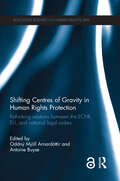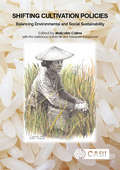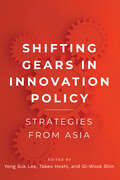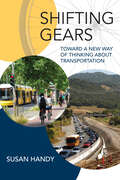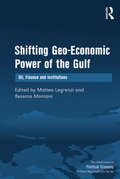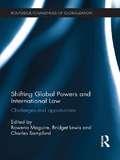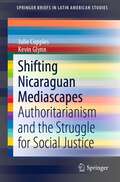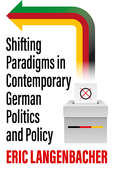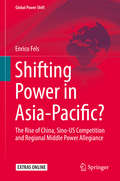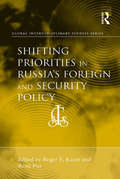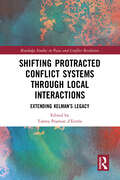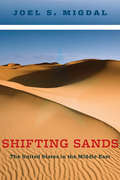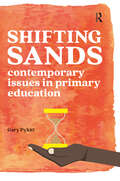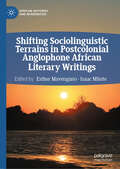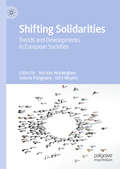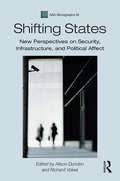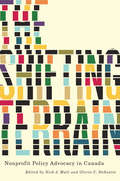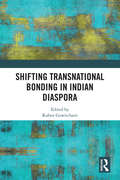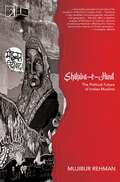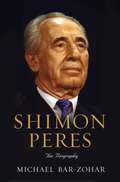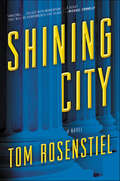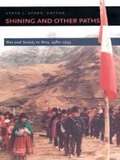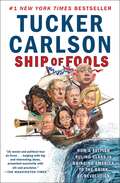- Table View
- List View
Shifting Centres of Gravity in Human Rights Protection: Rethinking Relations between the ECHR, EU, and National Legal Orders (Routledge Research in Human Rights Law)
by Antoine Buyse Oddný Mjöll ArnardóttirThe protection of human rights in Europe is currently at a crossroads. There are competing processes which push and pull the centre of gravity of this protection between the ECHR system in Strasbourg, the EU system in Luxemburg and Brussels, and the national protection of human rights. This book brings together researchers from the fields of international human rights law, EU law and constitutional law to reflect on the tug-of-war over the positioning of the centre of gravity of human rights protection in Europe. It addresses both the position of the Convention system vis-à-vis the Contracting States, and its positioning with respect to fundamental rights protection in the European Union. The first part of the book focuses on interactions in this triangle from an institutional and constitutional point of view and reflects on how the key actors are trying to define their relationship with one another in a never-ending process. Having thus set the scene, the second part takes a critical look at the tools that have been developed at European level for navigating these complex relationships, in order to identify whether they are capable of responding effectively to the complexities of emerging realities in the triangular relationship between the EHCR, EU law and national law.
Shifting Cultivation Policies: Balancing Environmental and Social Sustainability
by Malcolm CairnsShifting cultivation supports around 200 million people in the Asia-Pacific region alone. It is often regarded as a primitive and inefficient form of agriculture that destroys forests, causes soil erosion and robs lowland areas of water. These misconceptions and their policy implications need to be challenged. Swidden farming could support carbon sequestration and conservation of land, biodiversity and cultural heritage. This comprehensive analysis of past and present policy highlights successes and failures and emphasizes the importance of getting it right for the future. This book is enhanced with supplementary resources. The addendum chapters can be found at: www. cabi. org/openresources/91797
Shifting Gears in Innovation Policy: Strategies from Asia
by Yong Suk Lee, Takeo Hoshi, and Gi-Wook ShinIn the six Asian countries focused on in this book—China, India, Japan, Singapore, South Korea, and Taiwan—high economic growth has been achieved in many industrial sectors, the catch-up phase of growth has ended or is about to end, and technological frontiers have been reached in many industries. These countries can no longer rely on importing or imitating new technology from abroad and expanding imports, and instead have to develop their own innovations to maintain growth. The policy tools they often used to advance "innovation," for the most traditional industrial policies of identifying promising industries and promoting them, will no longer be effective. And indeed, governments in Asia have recently put forward new policies, such as China's push for mass entrepreneurship and innovation. Domestic conditions in Asian economies have also started to change. Many countries are facing rapidly aging populations and low birth rates: Japan's population, declining for several years, is the first population decline not caused by war or disease in the modern world; South Korea's labor force started to shrink in 2018 as well; China's huge population will start to age, even as a large part of the population remains poor. Facing these challenges, today Asia is at a juncture. East Asia as a whole has greater real economic output than North America, South and Southeast Asia possess enormous economic potential due to size and resources, and countries within Asia are becoming more connected in both trade and diplomacy. It is at this juncture that the authors of Shifting Gears examine and reassess Asia's innovation and focus on national innovation strategies and regional cluster policies that can promote entrepreneurship and innovation in the larger Asia-Pacific. Chapters explore how institutions and policies affect incentives for innovation and entrepreneurship; whether Asia's innovation systems are substantially different from those of other countries, and in which ways, and whether there are any promising strategies for promoting innovation.
Shifting Gears: Toward a New Way of Thinking about Transportation (Urban and Industrial Environments)
by Susan HandyAn expertly woven history and critique of the ideas shaping transportation in the United States.Excruciating traffic jams. Struggling transit agencies. An epidemic of pedestrian fatalities. It is clear that transportation is not working in the United States and that we need to rethink our approach. In Shifting Gears, Susan Handy provides an in-depth history of the ideas embedded in American transportation policy and the emergence of new ways of thinking that could give us better transportation options. Weaving in bits of her own personal narrative, Handy gives readers a deeper and clearer understanding of our transportation system and the roots of its successes and failures.Handy covers the myriad costs of car ownership, the futility of expanding highways, and the misplaced faith in technological innovation. She offers new ideas and strategies that can improve the health of our car-centric transportation system—most crucially, the idea that communities across the country must create an array of choices for daily travel. Shifting Gears asserts that a diverse transportation ecosystem is essential for creating more just, sustainable communities, but getting there will take a dramatic shift in how we think about transportation.
Shifting Geo-Economic Power of the Gulf: Oil, Finance and Institutions (The\international Political Economy Of New Regionalisms Ser.)
by Bessma MomaniBringing together for the first time distinguished Gulf experts to analyse the renewed geo-economic prominence of the Gulf states, this volume investigates some of the 'new power brokers' in the world economy: the oil-exporting states of the Gulf. The Gulf Cooperation Council's (GCC) members: Bahrain, Kuwait, Oman, Qatar, the United Arab Emirates and Saudi Arabia, collectively have the largest proven oil reserves in the world and are among the world's largest oil-exporting states. Gulf Arab states are actively pursuing a variety of foreign investment strategies. Some of these investments are being managed by sovereign wealth funds, government investment corporations, and government-controlled companies. This renewed geo-economic status has received a lot of media attention but there has been a dearth of academic study on what this shift in global economic power means for the international economic system. This volume aims to fill this gap with a rigorous scholarly analysis based on primary sources and raw economic data. It brings together the expertise of academics who have devoted their career to careful study of the region and of renowned scholars of international political economy.
Shifting Global Powers and International Law: Challenges and Opportunities (Challenges of Globalisation)
by Bridget Lewis Rowena Maguire Charles SampfordThis book explores the impacts of global economic, political and cultural shifts on various international legal frameworks and legal norms. The economic growth of states throughout Asia, South and Central America and Africa is having a profound effect on the dynamics of international relations, with a resulting impact on the operation and development of international law. This book examines the influence of emerging economies on international legal rules, institutions and processes. It describes recent and predicted changes in economic, political and cultural powers, flowing from the growth of emerging economies such as China, India, Brazil, South Africa and Russia, and analyses the influence of these changes on various legal frameworks and norms. Expert contributors drawn from a variety of fields, including international law, politics, environmental law, human rights, economics and finance, provide a broad analysis of the nature of the shifting global dynamic in its historical and contemporary contexts, and a range of perspectives on the impact of these changes as they relate to specific regimes and issues, including climate change regulation, collective security, indigenous rights, the rights of women and girls, environmental protection and foreign aid and development. The book provides a fresh and comprehensive analysis of an issue with extensive implications for international law and politics. Shifting Global Powers and International Law will be of interest to students and scholars of international relations; international law; international political economy, human rights; and development.
Shifting Nicaraguan Mediascapes: Authoritarianism and the Struggle for Social Justice (SpringerBriefs in Latin American Studies)
by Julie Cupples Kevin GlynnThis book explores the mediated struggles for autonomy, land rights and social justice in a context of growing authoritarianism and persistent coloniality in Nicaragua. To do so, it draws on in-depth fieldwork, analysis of media texts, and decolonial and other cultural theories. There are two main threats to the authoritarian rule of the Nicaraguan government led by Daniel Ortega: the first is the Managua-based NGO and civil society sector led largely by educated dissident Sandinistas, and the second is the escalating struggle for autonomy and land rights being fought by Nicaragua's indigenous and Afro-descended inhabitants on the country's Caribbean coast. In order to confront these threats and, it seems, secure indefinite political tenure, the government engages in a set of centralizing and anti-democratic political strategies characterized by secrecy, institutional power grabs, highly suspect electoral practices, clientelistic anti-poverty programmes, and the control through purchase or co-optation of much of the nation's media. The social movements that threaten Ortega's rule are however operating through dispersed and topological modalities of power and the creative use of emergent spaces for the circulation of counter-discourses and counter-narratives within a rapidly transforming media environment. The primary response to these mediated tactics is a politics of silence and a refusal to acknowledge or respond to the political claims made by social movements. In the current conjuncture, the authors identify a struggle for hegemony whose strategies and tactics include the citizenship-stripping activities of the state and the citizenship-claiming activities of black, indigenous and dissident actors and activists. This struggle plays out in part through the mediated circulation and counter-circulation of discourses and the infrastructural dynamics of media convergence.
Shifting Paradigms in Contemporary German Politics and Policy
by Eric LangenbacherGermany has undergone more change in the past two years than it has experienced in decades. In the fall of 2021, the Social Democratic Party unexpectedly surged to first place in the Bundestag elections, going on to lead a coalition of SPD, Greens, and Free Democrats that promised to “dare more progress” domestically. Then just two months after the new government was installed, Russia invaded Ukraine. The contributions in this volume investigate the altered state of German politics and predict the trajectory of Europe’s leading power in the transformed geopolitical environment.
Shifting Power in Asia-Pacific?
by Enrico FelsThis book investigates whether a power shift has taken place in the Asia-Pacific region since the end of the Cold War. By systematically examining the development of power dynamics in Asia-Pacific, it challenges the notion that a wealthier and militarily more powerful China is automatically turning the regional tides in its favour. With a special emphasis on Sino-US competition, the book explores the alleged linkage between the regional distribution of relevant material and immaterial capabilities, national power and the much-cited regional power shift. The book presents a novel concept for measuring power in international relations by outlining a composite index on aggregated power (CIAP) that includes 55 variables for 44 regional countries and covers a period of twenty years. Moreover, it develops a middle power theory that outlines the significance of middle powers in times of major power shifts. By addressing political, military and economic cooperation via a structured-focused comparison and by applying a comparative-historical analysis, the book analyses in depth the bilateral relations of six regional middle powers to Washington and Beijing.
Shifting Priorities in Russia's Foreign and Security Policy (Global Interdisciplinary Studies Series)
by Roger E. Kanet RÉmi PietGiven the resurgence of Russian economic capabilities and of Russia's role as a regional, even global, political actor, much of the literature written more than 4-5 years ago is already dated. The editor and contributors to this timely volume draw upon a broad range of analysts who deal with various aspects of Russian relations with its neighbours to the West and to the East. Implications for Russian foreign and security policy are key to understanding Russia's position in the 21st Century. Readers in Russian foreign and security policy; European, Eurasian, and Asian security; and contemporary international politics/security will find this volume invaluable.
Shifting Protracted Conflict Systems Through Local Interactions: Extending Kelman’s Legacy (Routledge Studies in Peace and Conflict Resolution)
by Tamra Pearson D’EstréeThis volume explores the evolution of theoretical and practical approaches to intervening in protracted conflicts, following the work of Herb Kelman. Interactive problem solving, as developed by Kelman and others, sought to increase understanding about the microprocesses of international relations. Kelman early on emphasised the centrality of an interactive approach for constructing new identities, new narratives, and new ways forward. Transforming conflict systems requires strategic attention to the interactions between agents of change that provide stability or induce shift. This volume on interactive conflict approaches includes both critical reflections and new ideas from scholar-practitioners who have developed, revised, and expanded these approaches. Contributors take up important issues, from the shape and likelihood of solutions in intractable conflicts to how individuals can exist in realities with seemingly irresolvable inner and outer conflicts. The volume represents the best of current thinking about how the mechanisms, theoretical framework, and application of interactive problem solving should be moved into the twenty-first century context of increasing complexity, increasing uncertainty, and increasing polarisation. This book will be of interest to students of peace studies, conflict resolution, and international relations.
Shifting Sands
by Joel S. MigdalJoel S. Migdal focuses on the approach U.S. officials adopted toward the Middle East after World War II, one that paid scant attention to tectonic shifts in the region. The United States did not restrict its strategic model to the Middle East -- beginning with Harry S. Truman, American presidents applied a uniform strategy rooted in the country's Cold War experience in Europe to regions across the globe, designed to project America into nearly every corner of the world while limiting costs and overreach.The approach was simple: find a local power that could play Great Britain's role in Europe after the war, sharing the burden of exercising power, and establish a security alliance along the lines of NATO. Yet regional changes following the creation of Israel, the Free Officers Coup in Egypt, the rise of Arab nationalism from 1948 to 1952, and, later, the Iranian Revolution and the Egypt-Israel peace treaty in 1979 complicated this project. Migdal shows how insufficient attention to these key transformations led to a series of missteps and misconceptions in the twentieth century. With the Arab uprisings of 2009--2011 prompting another major shift, Migdal sees an opportunity for the United States to deploy a new, more workable strategy, and he concludes with a plan for gaining a stable foothold.
Shifting Sands: Contemporary issues in primary schools (Practical Teaching)
by Gary PykittDo you feel as if the ground beneath your feet is constantly shifting?It’s not surprising if you do! Teachers today are faced with a range of complex, current issues that impact on teaching and learning as well as the need to understand and address a raft of new initiatives, directives and policy changes. All too often, policy is introduced and new agendas arise with little or no accompanying guidance.This accessible book takes a highly practical focus, provides the required information in one place, unpicks key elements of legislation and policy, and suggests practical approaches and resources that could be used in the classroom to successfully address the issues. It will increase your confidence and help you get to grips with areas such as safeguarding, e-safety, radicalisation, sex and relationships education, gender and identity, prejudice-based bullying, the issues of disadvantaged children, and mental health and well-being.
Shifting Sands: The United States in the Middle East
by Joel S. MigdalJoel S. Migdal revisits the approach U.S. officials have adopted toward the Middle East since World War II, which paid scant attention to tectonic shifts in the region. After the war, the United States did not restrict its strategic model to the Middle East. Beginning with Harry S. Truman, American presidents applied a uniform strategy rooted in the country's Cold War experience in Europe to regions across the globe, designed to project America into nearly every corner of the world while limiting costs and overreach.The approach was simple: find a local power that could play Great Britain's role in Europe after the war, sharing the burden of exercising power, and establish a security alliance along the lines of NATO. Yet regional changes following the creation of Israel, the Free Officers Coup in Egypt, the rise of Arab nationalism from 1948 to 1952, and, later, the Iranian Revolution and the Egypt-Israel peace treaty in 1979 complicated this project. Migdal shows how insufficient attention to these key transformations led to a series of missteps and misconceptions in the twentieth century. With the Arab uprisings of 2009 through 2011 prompting another major shift, Migdal sees an opportunity for the United States to deploy a new, more workable strategy, and he concludes with a plan for gaining a stable foothold in the region.
Shifting Sociolinguistic Terrains in Postcolonial Anglophone African Literary Writings (African Histories and Modernities)
by Isaac Mhute Esther MavenganoThis ground-breaking book focuses on the dynamic interplay between language and identity in postcolonial Anglophone African literature. It examines how African writers navigate and reshape linguistic/literary landscapes to articulate unique cultural experiences and resist neo-colonial legacies. The authors highlight the dynamics of sociolinguistic and cultural ecologies in the ever-evolving 21st century African and postcolonial contexts, and shed light on conceptions of African identities and humanity. The book contributes to postcolonial discourses and suggests new ways of reading changing textual practices, as well as providing important sites to rebuke differentiation politics at play between the Global South and North. The volume also illuminates intertextual conversations that will be insightful for other disciplines in the humanities. It will function as an important reference for scholars and students of languages, communication and media, Global South literatures, postcolonial African literary and cultural studies, and African philosophies and concepts. Whether one is an academic or a curious reader, this book promises to offer compelling insights and fascinating narratives that together enrich present-day understanding of the vibrant and evolving world of Anglophone African literature.
Shifting Solidarities: Trends and Developments in European Societies
by Ine Van Hoyweghen Valeria Pulignano Gert MeyersShifting Solidarities offers a comprehensive analysis of solidarity at a time when major social transformations have penetrated the heart of European societies, disrupting markets and labour relations, transforming social practices, and affecting the moral infrastructure of European welfare states. Factors such as the economic crisis, migration, digitalisation, and climate change all contribute to a sense of emergency. This volume considers how, in times of crisis, there are calls for solidarity by various new social and political actors and movements. The contributions present a broad array of empirical work and critical scholarship, zooming in on shifting solidarities in various domains of social life, including work, social policy, health care, religion, family, gender and migration. This compelling volume provides a unique resource for understanding solidarity in contemporary Europe, and will be a vital text for students and scholars across sociology, social policy, cultural studies, employment/labour markets and organisation studies, migration studies and European studies.
Shifting States: New Perspectives on Security, Infrastructure, and Political Affect (ASA Monographs)
by Alison DundonShifting States draws on a rich history of anthropological theorising on all kinds of states – from the pre- to the post- industrial – and explores topics as diverse as bureaucracy, infrastructure, surveillance, securitization, and public health. As we enter the third decade of the twentieth century, there is a growing sense that ‘the state’ is in crisis everywhere. Although the nature of this perceived crisis varies from place to place, everywhere it is seen to have been caused by some combination of the inter-related forces of ‘globalisation’, of successive economic shocks, and of the rise of social media-fuelled populist movements. Yet, conversely, there is also a creeping perception that state power is becoming more pervasive in its reach, and in its effects, in ways which make it ever more imminent to the material worlds in which we live, more fundamental to the ways in which we conceive of the future, and more foundational to our very sense of self. How might we try to make sense of, and to mediate, these apparently contradictory impressions? Based on ethnographic case studies from all over the world, this timely volume forges new ways of thinking about how state power manifests, and is imagined, and about the effects it has on ordinary people’s lives. In so doing, the volume provides tools not only for understanding states’ responses to the COVID-19 pandemic, but also for judging what effects these responses are likely to have.
Shifting Terrain: Nonprofit Policy Advocacy in Canada
by Peter R. Elson Gloria C. Desantis Nick J. MuléCanadian advocacy has evolved over the past few decades. A core function of the nonprofit sector, advocacy endures in an unsympathetic neoliberal landscape – one dominated by a rise in government surveillance, ongoing government funding cuts, and confusion over what activities are permissible. Exploring the unpredictable and fluid nature of public policy advocacy work carried out by nonprofit organizations across Canada, The Shifting Terrain sheds light on the strictures and opportunities of this crucial aspect of the voluntary sector. Authors from diverse backgrounds, including academics, activists, practitioners, and legal experts, illustrate what the shifting course of advocacy means in philosophical, theoretical, political, and practical terms. Offering a critique of advocacy practices directed at the nonprofit–provincial/territorial government interface and beyond, this anthology outlines regulatory changes made by the Canada Revenue Agency, exposes the conflicted internal structures and processes of advocacy work, challenges "permissible advocacy activities," presents provocative thinking about alternative ways forward, and proposes recommendations for improvement. A comparative historical study and a contemporary examination, The Shifting Terrain invites readers to contemplate the implications of advocacy for public participation, the shaping of public policy, and Canadian democracy.
Shifting Transnational Bonding in Indian Diaspora
by Ruben GowricharnThis volume examines Indian diasporic communities in various countries including the United Kingdom, Trinidad, Portugal, Netherlands, and Fiji, among others, and presents new perspectives on the shifting nature of Indian transnationalism. The book: Discusses how migrant communities reinforce the diaspora and retain a group identity, while at the same time maintaining a bond with their homelands; Highlights new tendencies in the configuration of Indian transnationalism, especially cultural entanglements with the host countries and the differentiation of homelands; Studies forces affecting bonding among these communities such as global and local encounters, glocalisation, as well as economic, political, and cultural changes within the Indian state and the wider Indian diaspora. Featuring a diverse collection of essays rooted in robust fieldwork, this volume will be of great importance for students and researchers of diaspora studies, globalization and transnational migration, cultural studies, minority studies, sociology, political studies, international relations, and South Asian studies.
Shikwa-e-Hind: The Political Future of Indian Muslims
by Dr Mujibur RehmanRoughly 200 million today, Indian Muslims are greater than the population of Britain and France or Germany put together. According to the Indian Constitution, Indian Muslims are treated as political equals, which is what India&’s secular polity promised after its independence, encouraging more than 35 million Indian Muslims at the time of Partition to choose India as their motherland over Pakistan. However, the supposed relationship of equality between Hindus and Muslims as scripted in the constitution is being increasingly replaced by the domineering tendencies of a Hindu majority in India today. The author describes the current state and position of Indian Muslims (the seeds for which were sown when the BJP came to power in 2014) as the thirdpolitical moment; the second he believes was in 1947 when the community was given equal status in the Indian Constitution; and the first, was in 1857 when Indian Muslims learnt to live under the British colonial state. As he states, there is no denying that political circumstances for Indian Muslims were not completely ideal or full of democratic energy prior to the rise of the Hindu Right since the late 1980s. With numerous layers defined by language, ethnicity, region, etc., Muslims have the most heterogeneous identity, representing India&’s quintessential diversity. And yet, Muslims are perceived as the most enduring well-grounded threat to the majoritarian project of the Hindu Rashtra. Indian Muslims are perceived or presented as perpetrators of violence and violators of law, even if they are at the receiving end. They are viewed as an internal enemy, who need to be dealt with for political, social, historical, and ideological reasons. Going forward, the community must formulate the language of democratic rights of Indian Muslims as equal citizens and define the ethics of human dignity in their struggle to reassert their place in India&’s political power structures at all levels: from panchayat to Parliament. While the economic future or cultural rights of Indian Muslims have been debated since 1947, it is the political future that demands attention because only as an equal and participatory community in the politics of the nation, can economic and cultural futures be addressed. This book explores the political future of Indian Muslims in this context. From Shaheen Bagh to Hindu-Muslim riots, from the unique position of Muslim women in India to the Sachar Report and the Muslim backwardness debate, Mujibur Rehman analyses, confronts and discusses the urgent concerns of Indian Muslims in a manner that is nuanced and globally relevant.
Shimon Peres
by Michael Bar-ZoharTwice Israel’s prime minister, winner of the Nobel Peace Prize, bold leader in a war-torn region, Shimon Peres is one of the great statesmen of the modern world. Peres is also a fascinating, complex man–a brilliant intellectual who is entirely at home in the corridors of power; an individual revered by the world and yet highly controversial in his own country; at once a hero and a figure of tragedy. Now, in this definitive biography, Michael Bar-Zohar takes the full measure of a towering, enigmatic leader. Drawing on his decades-long association with Peres, as well as the full cooperation of the leader’s family, friends, supporters, and political rivals, Bar-Zohar has crafted a vibrant, daring, richly textured portrait of a man whose life and career span the entire history of Israel. Born in Poland in 1923, Peres emigrated to the Holy Land at the age of twelve, already a fiercely idealistic Zionist. Peres joined a kibbutz and, while still in his teens, became the leader of a major youth movement. When the struggle for Israeli independence broke out, future prime minister David Ben-Gurion tapped him to join his inner circle. As director general of the Defense Ministry under Ben-Gurion, Peres spearheaded a far-reaching campaign to turn Israel into a major military power. He jump-started Israel’s aircraft industry, forged a secret alliance with France, and successfully pursued his dream of making Israel a nuclear power. And yet Peres’s real triumph came not as a man of war but as a peacemaker. Elected prime minister in 1984, Peres brought new hope by pulling Israeli troops out of the quagmire in Lebanon, defusing tensions with Jordan, and, at the risk of his own political future, making serious overtures to the Palestinians. Peres and his longtime rival Yitzhak Rabin together secured the top-secret Oslo Accords of 1993, which won them and Yasser Arafat the Nobel Peace Prize–only to see the hope of peace shattered in a resurgence of regional violence. In a half-century of leadership, Peres has worked beside–or fought against–such giants as Moshe Dayan, Golda Meir, Menachem Begin, Ariel Sharon, and, tragically, Rabin, who was slain at the rally that marked his reconciliation with Peres. Still powerful in his eighties, Peres stands as a true hero, a visionary who embodies the history of his nation. In this stunning, courageously frank, and scrupulously factual biography, Michael Bar-Zohar gives an eminent man his due. From the Hardcover edition.
Shin Kanemaru and the Tragedy of Japan’s Political System
by Uldis KruzeShin Kanemaru (1914-1996) served as a key power broker at the national level in Japan from the 1970s until the early 1990s. He was at the heart of the '1955 system' of conservative political rule. Though never Prime Minister himself, he controlled or strongly influenced the administrations of five Japanese Prime Ministers.
Shining City: A Novel
by Tom RosenstielNPR Best Book of 2017A polished and gripping political debut that Michael Connelly calls “an edge of your seat thriller,” Shining City is set in DC amid a harrowing Supreme Court nomination fight.“Amazing. . . . Pulses with momentum. . . . A debut that will be remembered for years.” —Michael ConnellyPeter Rena is a “fixer.” He and his partner, Randi Brooks, earn their living making the problems of the powerful disappear. They get their biggest job yet when the White House hires them to vet the president’s nominee for the Supreme Court. Judge Roland Madison is a legal giant, but he’s a political maverick, with views that might make the already tricky confirmation process even more difficult. Rena and his team go full-bore to cover every inch of the judge’s past, while the competing factions of Washington D.C. mobilize with frightening intensity: ambitious senators, garrulous journalists, and wily power players on both sides of the aisle.All of that becomes background when a string of seemingly random killings overlaps with Rena’s investigation, with Judge Madison a possible target. Racing against the clock to keep his nominee safe, the President satisfied, and the political wolves at bay, Rena learns just how dangerous Washington’s obsession with power—how to get it and how to keep it—can be.Written with razor-sharp political insight and heart-pounding action, Shining City is a hugely impressive debut that announces a major new talent.
Shining and Other Paths: War and Society in Peru, 1980-1995
by Steve J. SternShining and Other Paths offers the first systematic account of the social experiences at the heart of the war waged between Shining Path and the Peruvian military during the 1980s and early 1990s. Confronting and untangling the many myths and enigmas that surround the war and the wider history of twentieth-century Peru, this book presents clear and often poignant analyses of the brutal reshaping of life and politics during a war that cost tens of thousands of lives.The contributors--a team of Peruvian and U.S. historians, social scientists, and human rights activists--explore the origins, social dynamics, and long-term consequences of the effort by Shining Path to effect an armed communist revolution. The book begins by interpreting Shining Path's emergence and decision for war as one logical culmination, among several competing culminations, of trends in oppositional politics and social movements. It then traces the experiences of peasants and refugees to demonstrate how human struggle and resilience came together in grassroots determination to defeat Shining Path, and explores the unsuccessful efforts of urban shantytown dwellers, as well as rural and urban activists, to build a "third path" to social justice. Integral to this discussion is an examination of women's activism and consciousness during the years of the crisis. Finally, this book analyzes the often paradoxical and unintended legacies of this tumultuous period for social and human rights movements, and for presidential and military leadership in Peru.Extensive field research, broad historical vision, and strong editorial coordination enable the authors to write a coherent and deeply humanistic account, one that draws out the inner tragedies, ambiguities, and conflicts of the war.Providing historically grounded explication of the conflicts that reshaped contemporary Peru, Shining and Other Paths will be widely read by Latin Americanists, historians, anthropologists, gender theorists, sociologists, political scientists, and human rights activists.Contributors. Jo-Marie Burt, Marisol de la Cadena, Isabel Coral Cordero, Carlos Iván Degregori, Iván Hinojosa, Carlos Basombrío Iglesias, Florencia E. Mallon, Nelson Manrique, Hortensia Muñoz, Enrique Obando, Patricia Oliart, Ponciano del Pino H., José Luis Rénique, Orin Starn, Steve J. Stern
Ship of Fools: How a Selfish Ruling Class Is Bringing America to the Brink of Revolution
by Tucker CarlsonThe host of Fox News Channel’s Tucker Carlson Tonight offers a blistering critique of the new American ruling class, the elites of both parties, who have taken over the ship of state, leaving the rest of us, the citizen-passengers, to wonder: How do we put the country back on course? <P><P><b>A New York Times Bestseller</b>
